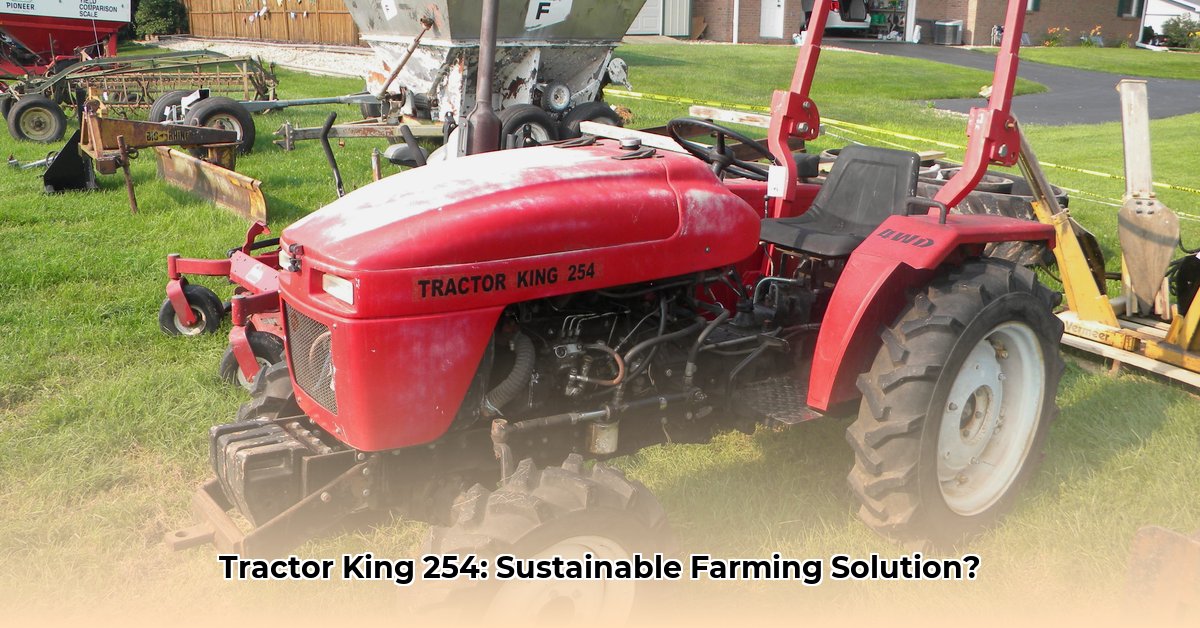
Market Performance Analysis: A Limited View
The Tractor King 254 appears on used equipment marketplaces like TractorHouse, suggesting some market demand. However, detailed sales data—crucial for a comprehensive analysis—is currently lacking. Sales trends are visible, but precise figures on price variations based on condition, location, and age are unavailable. This limits our ability to definitively assess market performance and its implications for sustainability. Without a clear understanding of pricing, we can't reliably determine if its popularity is driven by affordability or scarcity of newer models. The absence of this critical information hinders a robust market analysis. This lack of comprehensive data raises questions regarding the true extent of market demand and the implications for sustainable farming practices. For more detailed specifications, visit the Tractor King 254 website.
Sustainability Assessment: Potential, but Unproven
Could the Tractor King 254 contribute to sustainable agriculture? Its smaller size potentially offers advantages. Smaller tractors can reduce soil compaction compared to larger models, promoting healthier soil—a cornerstone of sustainable farming. But this potential benefit needs rigorous verification. Significant data gaps prevent a definitive conclusion regarding its overall sustainability.
Critical Data Gaps:
- Fuel Efficiency: Precise fuel consumption data (liters/hectare or gallons/acre) is missing, hindering any accurate comparison to other tractors.
- Emissions: Comprehensive emission data (CO2, NOx, particulate matter) are crucial but absent, preventing a proper assessment of its environmental footprint.
- Maintenance Costs: Long-term maintenance expenses significantly influence sustainability. Without detailed cost data, evaluating its overall lifecycle impact is impossible.
Without this information, any claim about the Tractor King 254's sustainability remains speculative. The current lack of empirical evidence makes a definitive assessment premature.
Future Outlook: Research and Regulatory Implications
To truly assess the Tractor King 254's role in sustainable agriculture, a multi-pronged approach is necessary:
- Comprehensive Field Studies: Independent research focused on fuel efficiency, emission profiles, and lifecycle cost analysis is essential.
- Data Collection Initiatives: Collaboration between manufacturers, dealers, and farmers is needed to collect real-world usage data, including maintenance costs, operational hours, and fuel consumption.
- Comparative Analysis: Benchmarking the Tractor King 254 against similar tractors on both performance and environmental metrics is necessary to determine its comparative advantages.
- Regulatory Landscape: The impact of ever-stricter emission regulations and changing environmental standards must be considered.
The evolving regulatory landscape underscores the importance of comprehensive data collection. Future analyses must account for government regulations and potential technological advancements in agricultural machinery. This proactive approach will ensure informed decision-making.
Conclusion: The Need for More Data
While the Tractor King 254 might offer advantages for sustainable farming due to its smaller size, crucial data are currently unavailable to confirm this. The absence of robust data on fuel efficiency, emissions, and maintenance costs prevents a definitive conclusion on its role in sustainable practices. Further research and collaborative data collection are essential before any concrete assessment of its sustainability can be made.
Call to Action
Readers with access to relevant data on the Tractor King 254’s performance and environmental impact are encouraged to contribute. Sharing this information will help build a more comprehensive understanding and inform future assessments of its suitability for sustainable agriculture.